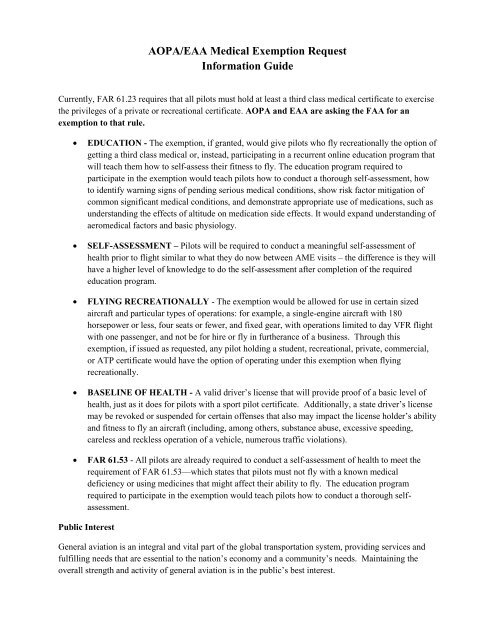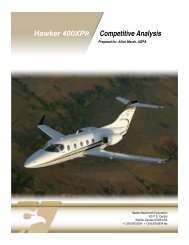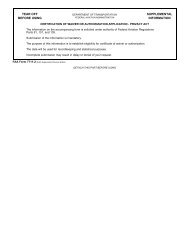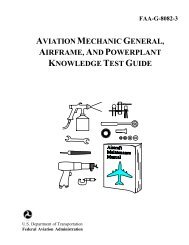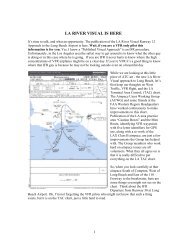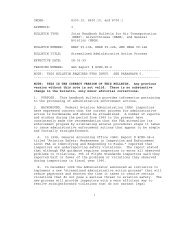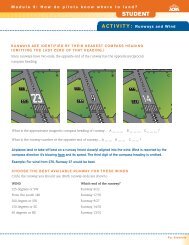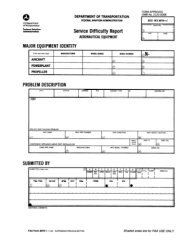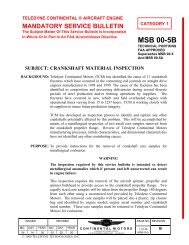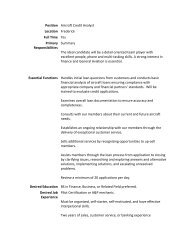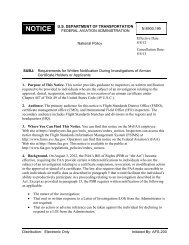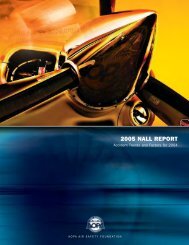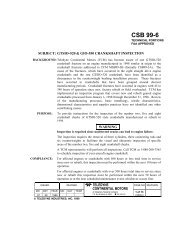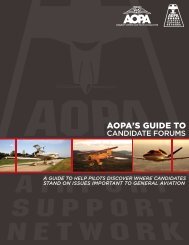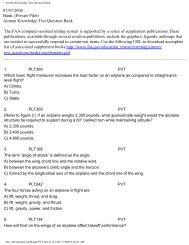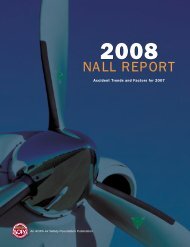AOPA/EAA Guide to the Medical Petition
AOPA/EAA Guide to the Medical Petition
AOPA/EAA Guide to the Medical Petition
Create successful ePaper yourself
Turn your PDF publications into a flip-book with our unique Google optimized e-Paper software.
<strong>AOPA</strong>/<strong>EAA</strong> <strong>Medical</strong> Exemption Request<br />
Information <strong>Guide</strong><br />
Currently, FAR 61.23 requires that all pilots must hold at least a third class medical certificate <strong>to</strong> exercise<br />
<strong>the</strong> privileges of a private or recreational certificate. <strong>AOPA</strong> and <strong>EAA</strong> are asking <strong>the</strong> FAA for an<br />
exemption <strong>to</strong> that rule.<br />
<br />
<br />
<br />
<br />
<br />
EDUCATION - The exemption, if granted, would give pilots who fly recreationally <strong>the</strong> option of<br />
getting a third class medical or, instead, participating in a recurrent online education program that<br />
will teach <strong>the</strong>m how <strong>to</strong> self-assess <strong>the</strong>ir fitness <strong>to</strong> fly. The education program required <strong>to</strong><br />
participate in <strong>the</strong> exemption would teach pilots how <strong>to</strong> conduct a thorough self-assessment, how<br />
<strong>to</strong> identify warning signs of pending serious medical conditions, show risk fac<strong>to</strong>r mitigation of<br />
common significant medical conditions, and demonstrate appropriate use of medications, such as<br />
understanding <strong>the</strong> effects of altitude on medication side effects. It would expand understanding of<br />
aeromedical fac<strong>to</strong>rs and basic physiology.<br />
SELF-ASSESSMENT – Pilots will be required <strong>to</strong> conduct a meaningful self-assessment of<br />
health prior <strong>to</strong> flight similar <strong>to</strong> what <strong>the</strong>y do now between AME visits – <strong>the</strong> difference is <strong>the</strong>y will<br />
have a higher level of knowledge <strong>to</strong> do <strong>the</strong> self-assessment after completion of <strong>the</strong> required<br />
education program.<br />
FLYING RECREATIONALLY - The exemption would be allowed for use in certain sized<br />
aircraft and particular types of operations: for example, a single-engine aircraft with 180<br />
horsepower or less, four seats or fewer, and fixed gear, with operations limited <strong>to</strong> day VFR flight<br />
with one passenger, and not be for hire or fly in fur<strong>the</strong>rance of a business. Through this<br />
exemption, if issued as requested, any pilot holding a student, recreational, private, commercial,<br />
or ATP certificate would have <strong>the</strong> option of operating under this exemption when flying<br />
recreationally.<br />
BASELINE OF HEALTH - A valid driver’s license that will provide proof of a basic level of<br />
health, just as it does for pilots with a sport pilot certificate. Additionally, a state driver’s license<br />
may be revoked or suspended for certain offenses that also may impact <strong>the</strong> license holder’s ability<br />
and fitness <strong>to</strong> fly an aircraft (including, among o<strong>the</strong>rs, substance abuse, excessive speeding,<br />
careless and reckless operation of a vehicle, numerous traffic violations).<br />
FAR 61.53 - All pilots are already required <strong>to</strong> conduct a self-assessment of health <strong>to</strong> meet <strong>the</strong><br />
requirement of FAR 61.53—which states that pilots must not fly with a known medical<br />
deficiency or using medicines that might affect <strong>the</strong>ir ability <strong>to</strong> fly. The education program<br />
required <strong>to</strong> participate in <strong>the</strong> exemption would teach pilots how <strong>to</strong> conduct a thorough selfassessment.<br />
Public Interest<br />
General aviation is an integral and vital part of <strong>the</strong> global transportation system, providing services and<br />
fulfilling needs that are essential <strong>to</strong> <strong>the</strong> nation’s economy and a community’s needs. Maintaining <strong>the</strong><br />
overall strength and activity of general aviation is in <strong>the</strong> public’s best interest.
Maintains or Enhances Safety<br />
Granting this petition would provide an equivalent level of safety and, in practice, stands <strong>to</strong> provide a<br />
greater level of safety. This petition for exemption requires initial and recurrent education on aeromedical<br />
fac<strong>to</strong>rs exceeding those presently mandated by <strong>the</strong> FAA and requires an operating limitation linked <strong>to</strong><br />
state-issued driver’s license standards and a self-assessment standard. It also helps <strong>to</strong> mitigate <strong>the</strong><br />
increased risk that may occur naturally when pilots transition in<strong>to</strong> unfamiliar and sometimes distinctly<br />
different aircraft in order <strong>to</strong> avoid FAA medical testing requirements. This petition gives those pilots an<br />
alternative that may allow <strong>the</strong>m <strong>to</strong> continue <strong>to</strong> fly and <strong>to</strong> do so in aircraft in which <strong>the</strong>y have familiarity<br />
and experience.<br />
Equivalent level of safety is demonstrated in his<strong>to</strong>ry - Statistical evidence supports our request<br />
<br />
<br />
An equivalent level of safety regarding aeromedical fac<strong>to</strong>rs exists between those operations that<br />
currently require a medical certificate and those operations that do not currently require a medical<br />
certificate. There is an extremely low incidence of medically related accidents across both<br />
factions, supporting <strong>the</strong> conclusion that a medical certificate may not always be required in order<br />
<strong>to</strong> maintain a lower incidence of medically related aviation accidents.<br />
Seven years of statistical evidence <strong>to</strong> support <strong>the</strong> petition - An ASI study of light sport aircraft<br />
accidents from 2004 – 2011 has shown that <strong>the</strong>re have been NO accidents attributable <strong>to</strong> pilot<br />
medical deficiency.<br />
Reduces Unnecessary Burdens and Barriers<br />
This petition for exemption would reduce <strong>the</strong> unduly burdensome and needless barriers for this population<br />
of pilots who may safely operate a greater number of available aircraft.<br />
<br />
<br />
<br />
More than 70 percent of <strong>AOPA</strong> and <strong>EAA</strong> members have expressed a strong interest in changing<br />
<strong>the</strong> third class medical requirement for pilots flying recreationally.<br />
If granted, <strong>the</strong> exemption would allow <strong>the</strong> use of close <strong>to</strong> 100,000 aircraft – aircraft most familiar<br />
and available <strong>to</strong> pilots.<br />
Our petition offers substantial economic savings <strong>to</strong> pilots and <strong>the</strong> U.S. government. A<br />
conservative estimate shows a savings of more than $241 million for pilots and $11 million <strong>to</strong> <strong>the</strong><br />
federal government over 10 years.<br />
Members and Non-Members Can Help<br />
Anyone interested in supporting our initiative can sign up <strong>to</strong> receive updates online. Anyone who has<br />
submitted <strong>the</strong>ir email address will receive an email notification when <strong>the</strong> exemption is open for comments<br />
online and a template for writing and submitting valuable comments in support of <strong>the</strong> effort. The window<br />
for comments will likely only be open for approximately 60 days.<br />
2


